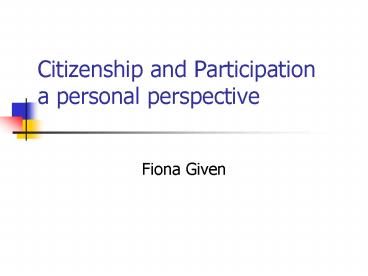Citizenship and Participation a personal perspective PowerPoint PPT Presentation
1 / 21
Title: Citizenship and Participation a personal perspective
1
Citizenship and Participationa personal
perspective
- Fiona Given
2
Our Progress to Date
- De-institutionalisation
- Inclusive education
- Open employment
3
What is citizenship?
- The boundaries of citizenship are determined by
the individuals who share a relationship with the
state, and the individual citizen's personal
relationship with the state. - Equality amongst all citizens.
4
Social Model of Disability
- Born in the United Kingdom in the 1980s.
- Locates the problem of disability within society
instead of the individual. - The medical perspective of disability focuses on
the individual as the deviant subject, rather
than on the social structures that label
difference as deviance and pathology. - Longman and Umansky (2001)
5
What does Society need to Change?
- Buildings need to be made accessible.
- Public transport needs to be made accessible.
- Educational institutions and employers need to
adopt flexible practices.
6
Are service providers facilitating social
participation or creating another barrier?
7
Medical Model of Disability
- Historically, service providers have followed the
medical model. - Medicine does have a place in disability.
- The medical model fails people with disabilities
where it promotes institutionalization and
exclusion.
8
Have Service Providers Been Promoting Social
Participation?
- Social participation has been largely tokenistic
and people with disabilities have had little to
gain from it. - Congregate care must end.
- People need to be supported individually.
9
What is not Social Participation?
- A group of people with disabilities sitting in a
foodcourt for a couple of hours - They are not engaging with the community
- People need to choose who they socialize with
10
How individual are IPPs?
- Goals must fit within the guidelines.
- People attending the same day centre conveniently
having the goal is not a person centred plan.
11
Choice
- Service users have informed choices
- Decisions should be made independent of parents
and carers. - Their choices should not be unduly restricted by
service providers and funding guidelines.
12
Employment
- People who can work should be encouraged to do so
- It may not always be clear who is and who is not
able to work - Employment enhances social participation
13
Risk Taking
- Perceived risks associated with people with
disabilities arriving employment - Concerns about there being no support available
if people are no longer able to work - People with disabilities should not be
discouraged from taking risks
14
Appropriate Employment Support
- People in open employment need to be supported in
the least obtrusive way possible. - The relationship must be between the employer and
the employee, not the employer and the disability
employment service.
15
Over Specialization of Disability
- The needs of people with disabilities just should
be blended into the mainstream. - Specialization does not always deliver the best
outcomes for people with disabilities or society
as a whole.
16
Challenges in Providing Individualized Support
- Funding
- Occupational Health and Safety
- Disability Service Provider Culture
- Societal Attitudes
17
Funding
- Funding should not be consumed by management.
- There needs to be greater transparency in the way
services manage their funds. - Individual choice should not be sacrificed for
financial savings.
18
Occupational Health and Safety
- Services have significantly reduced their social
participation services because they have been
deemed unsafe for staff. - Many services have failed to consider the impact
this has on disability rights. - Services need to ensure OHS obligations are met
without sacrificing disability rights.
19
Disability Service Provider Culture
- Most disability service providers are centred
around the staff instead of people with
disabilities. - Some staff want to take the easy way out.
- Poor staff practices must end.
20
Societal Perceptions
- Easiest challenge to overcome.
- Service providers need to lead the way in giving
people with disabilities the respect they
deserve.
21
Is it our industry or their support? Robert
Cook (2005)

